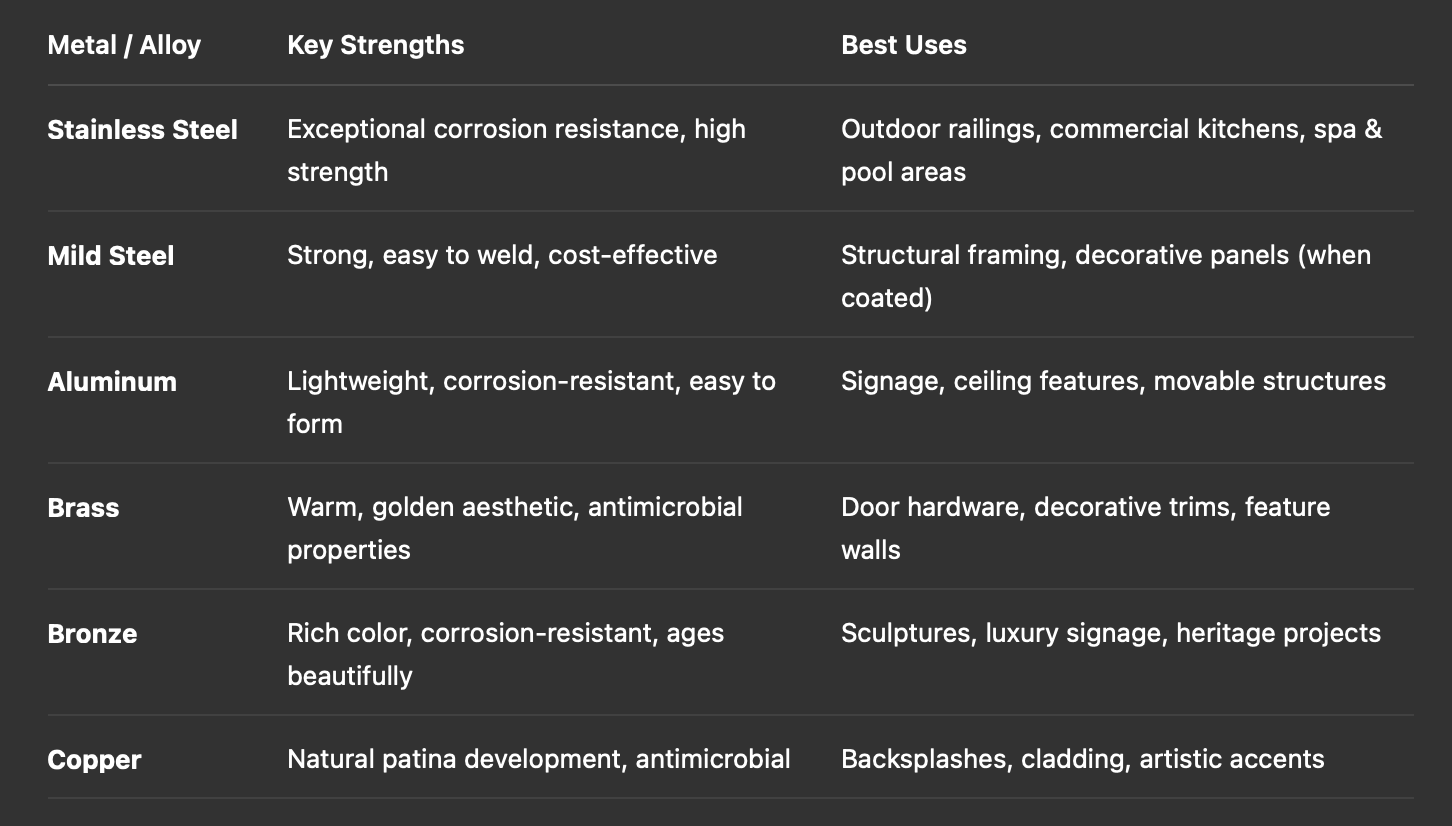The Science of Strength: How Metal Thickness and Alloys Impact Durability
Metal thickness plays a crucial role in custom metal fabrication, influencing the strength, longevity, and overall performance of your finished piece. In fact, along with the choice of alloy, it determines how well your design will stand up to structural demands, environmental exposure, and daily wear.
Whether you’re specifying metal for a luxury residential staircase, a commercial feature wall, or an outdoor installation, understanding these fundamentals will help you choose a solution that not only looks stunning but also lasts for decades.
1. Why Metal Thickness Matters
Metal thickness directly affects a piece’s structural strength, load capacity, and resistance to wear. As a result, it plays a significant role in determining the lifespan and safety of a design.
Gauge and Millimeters
In North America, sheet metal thickness is often measured in gauge (for steel and aluminum). The important thing to remember is that the lower the gauge, the thicker the metal. For example:
+ 10 gauge steel = ~3.4 mm thick
+ 16 gauge steel = ~1.5 mm thick
Additionally, in architectural projects, thickness is sometimes specified in millimeters for greater precision.
Impact on Strength
Thicker metal can handle greater structural loads and better resist denting or warping. Therefore, it’s ideal for handrails, gates, and heavy-duty outdoor structures.
Aesthetic Considerations
While thicker materials convey a feeling of solidity and luxury, they also weigh more. Consequently, this extra weight can impact installation methods and structural support requirements.
2. Understanding Alloys and Their Performance
An alloy is a mixture of metals designed to improve certain properties—such as strength, corrosion resistance, weight, or appearance. Because of this, choosing the right alloy is just as important as selecting the correct thickness.
Here’s a quick guide to common alloys used in architectural metalwork:
3. Matching Thickness and Alloy to Your Project
The key to performance is pairing the right metal with the right thickness for the intended application. For example:
+ For Structural Loads:
Use thicker mild steel or stainless steel for gates, staircases, and heavy-duty supports.
Example: A self-supporting outdoor gate might require 10–12 gauge stainless steel for stability.
+ For Lightweight Designs:
Aluminum allows for larger panels with reduced weight.
Example: A perforated aluminum ceiling panel can create visual impact without overloading the structure.
+ For Decorative Luxury Finishes:
Brass and bronze can be used in thinner sheets when the application is purely aesthetic.
Example: 1.5 mm brass cladding on a reception desk adds richness without excessive weight.
Ultimately, matching thickness and alloy ensures both beauty and function.
4. Considering Environment and Wear
Where and how the metal will be used should guide your choice. In other words, the environment is just as important as the material itself.
+ Outdoor Coastal Environments:
Opt for marine-grade stainless steel or bronze for maximum corrosion resistance.
+ High-Traffic Interiors:
Choose thicker metals or harder alloys to withstand impact and wear.
+ Heritage or Restoration Work:
Use alloys like bronze or copper that develop a patina, complementing the building’s age and style.
Therefore, a thoughtful selection can prevent premature wear and costly repairs.
5. The MNR Custom Metal Approach
At MNR Custom Metal, we balance engineering precision with design excellence. From the very start, every project begins with an in-depth consultation to determine the right alloy, thickness, and finish—ensuring your piece not only looks exceptional but also stands the test of time.
Whether you’re aiming for ultra-modern stainless steel minimalism or old-world bronze elegance, our team fabricates to exact specifications. As a result, you get strength, style, and durability in one package.
See more
- The Role of Metal Fabrication in Commercial Interior Design
- Maximize Space and Style with Metal Fabrication: The Ultimate Guide to Kitchen Metal Shelving Units for Residential Projects
- Bespoke vs. Off-the-Shelf: Why Custom Metal Fabrication is Worth the Investment
- Top 5 Mistakes to Avoid in Custom Metal Design
- The Art of Patina: Creating Distinctive Metal Finishes for Architectural Designs
- Fireplace Surrounds Reinvented: How Custom Metal Cladding Turns a Functional Element Into a Focal Point


